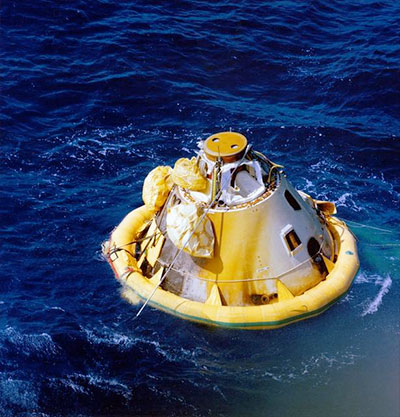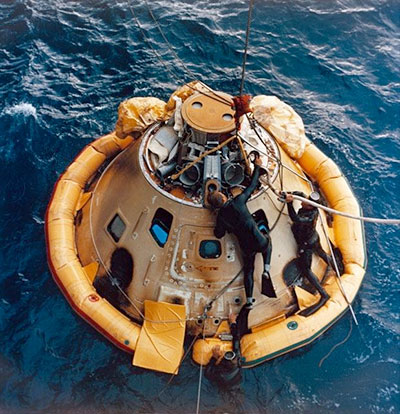|
Author
|
Topic: Apollo command module without Kapton foil
|
1202 Alarm
Member Posts: 436
From: Switzerland & France
Registered: Nov 2003
|
 posted 11-21-2017 03:11 AM
posted 11-21-2017 03:11 AM
   
We are all used to the pictures of the Apollo command module after splashdown, but these two of Apollo 6 are clearly different. You can see burns, but no kapton foils.So, it was possible to get an Apollo CM back without these layers of protection, at least from earth orbit? Also, why any CM (as far as I remember) was ever kept in a "post landing" condition untouched, with all its remaining kapton still on it? That would have been quite spectacular.  
|
Robert Pearlman
Editor Posts: 42981
From: Houston, TX
Registered: Nov 1999
|
 posted 11-21-2017 03:51 AM
posted 11-21-2017 03:51 AM
   
NASA's Apollo Experience Report: Thermal Protection Subsystem notes that the Apollo 6 spacecraft (CM 020) flew without the pressure-sensitive Kapton polyimide tape: The only difference between the Apollo 6 mission and the Apollo 4 mission in regard to thermal configuration was that CM 020 had the Block II thermal-control coating removed... As for keeping other command modules in their post-splashdown condition, in addition to recovery team members stripping off Kapton as souvenirs, North American Rockwell removed the tape in the process of inspecting and analyzing the performance of the spacecraft. |
David Carey
Member Posts: 782
From:
Registered: Mar 2009
|
 posted 11-21-2017 11:46 AM
posted 11-21-2017 11:46 AM
   
Perhaps related in part to an earth-orbital return, Apollo 7 at the Frontiers of Flight Museum and Apollo 9's Gumdrop at the San Diego Air and Space Museum still have quite a bit of the original foil and surface finish.I'd certainly call both closer to "as-landed" versus the scrubbed look of A8 and A10-A17 CMs after de-processing.
|
stsmithva
Member Posts: 1933
From: Fairfax, VA, USA
Registered: Feb 2007
|
 posted 11-21-2017 05:07 PM
posted 11-21-2017 05:07 PM
   
I remember reading a cS post in which somebody said that a CM used to be displayed with the remains of the Kapton still on, and regularly the pieces that fell off were swept up and thrown away. |
Rick Mulheirn
Member Posts: 4167
From: England
Registered: Feb 2001
|
 posted 11-22-2017 03:38 AM
posted 11-22-2017 03:38 AM
   
I visted the Apollo 4 command module at Stennis back in 1995 and it was shedding kapton like a sunburnt teenager! |
oly
Member Posts: 905
From: Perth, Western Australia
Registered: Apr 2015
|
 posted 11-22-2017 05:09 AM
posted 11-22-2017 05:09 AM
   
As can be seen by the two photos of Apollo 6 post splashdown there are several areas of concentrated burning from the aerodynamic heating during re-entry. As these early flights experienced lower velocities than the speeds gained during lunar return flights the post flight test of heat shields and capsule surface treatment thermal protection would necessitate sampling of materials and the sub structure to give an idea of how the structure would handle lunar return re-entry. Some of these test methods may require the removal of any surface coatings to expose the lower materials or allow non-destructive testing methods to be used that may be effected by the coatings or the methods may not test thru these coatings. One test would be a basic visual inspection of the epoxy material that cant be seen with the Kapton in place. |













